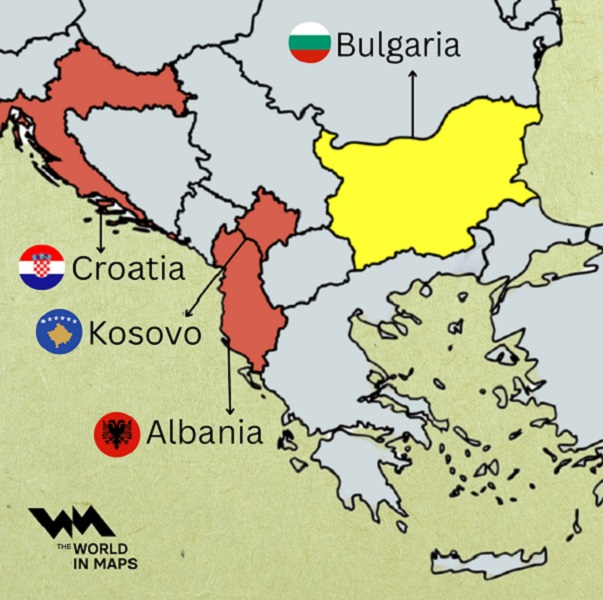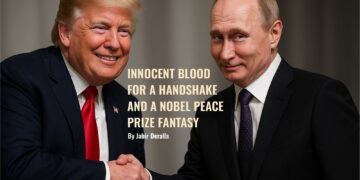 By Xhabir Deralla
By Xhabir Deralla
for The Balkan Forum
Security is not a provocation. Deterrence is not escalation. In a region marked by nightmarish memories and relentless manipulation, standing still is not neutrality – it’s surrender. In a land scarred by the shadows of past wars and present-day power plays, security is not a given – it must be built, guarded, and reaffirmed with every new threat. The Western Balkans, long a geopolitical fault line, remains exposed to both old wounds and new dangers, as foreign intrusion and internal instability continue to test the region’s fragile equilibrium. Against this backdrop, moments of strategic clarity and cooperation carry far more than symbolic weight – they shape the future.
On March 18, 2025, Albania, Croatia, and Kosovo signed a trilateral defense cooperation agreement in Tirana. The agreement (PDF link) – reaffirming joint commitments to security, defense industry development, and military interoperability – marks more than a technical alignment. It is a bold, strategic statement of shared purpose in a region once shattered by war, and now tested by the renewed threats of authoritarianism, hybrid warfare, and geopolitical maneuvering. The agreement outlines plans for joint training, exercises, and cooperation in developing and acquiring defense systems. As the signatories emphasized, this initiative is not about provoking conflict but preventing it – a stabilizing force in a region long shaped by geopolitical rivalries.
The agreement is grounded in NATO’s Strategic Concept and the EU’s Strategic Compass for Security and Defense, echoing the principles of collective security and a forward-looking strategy of deterrence. Its significance is magnified by Russia’s ongoing war of aggression against Ukraine and Moscow’s broader campaign of hybrid warfare. This assault on the West has been a defining feature of Vladimir Putin’s regime for most of his time in power, and has escalated dramatically since 2022.
Russia’s hybrid tactics are well-documented: disinformation operations, cyberattacks, support for separatist and extremist actors, economic coercion, election interference, and political subversion. These tools are systematically deployed to erode democratic institutions, and destabilize vulnerable regions – none more so than the Western Balkans. In this context, the Croatia-Albania-Kosovo agreement emerges not only as a regional security arrangement, but as a proactive stance against hybrid threats that seek to fracture NATO’s unity, undermine democratic resilience, and roll back the Euro-Atlantic integration of Southeast Europe.
Serbia’s role and Russia’s shadow
Russia continues to spread its influence in the Balkans through its primary regional proxy – Serbia. Belgrade continues refusing to recognize Kosovo’s independence, backs the extremist leadership of Bosnia’s Republika Srpska, stirs and exacerbates political divisions in Montenegro, and meddles in North Macedonia’s fragile political landscape. Serbia has also provided sanctuary to militant groups responsible for terrorist attacks in Kosovo (Banjska, 2023; and Ibar-Lepenec canal, 2024) all while pursuing rapid military armament with open backing from authoritarian regimes, including Russia and China.
These actions are not isolated incidents, but part of a broader strategy of regional destabilization – one that echoes Serbia’s destructive and bloody legacy of the 1990s and beyond.
Let’s take a snapshot of the history that still shapes the present. As the most powerful republic of the former Yugoslavia, Serbia unilaterally revoked Kosovo’s autonomy in 1989, dismantling constitutional guarantees enshrined in the 1974 Yugoslav constitution. This act triggered a period of intense repression, marked by systemic discrimination, institutionalized violence, and gross human rights abuses against Kosovo Albanians. The subsequent collapse of Yugoslavia unleashed a series of brutal wars, waged under the guise of “protecting Serbs,” during which Serbian forces committed some of the most horrific war crimes in post-WWII Europe – including the genocide in Srebrenica, mass killings of civilians, and the operation of concentration camps. To this day, Serbian authorities have not issued a single official document acknowledging responsibility for these atrocities.
In contrast, countries like Albania, Croatia, and Kosovo are asserting their right to protect themselves – not through aggression, but through cooperation, transparency, and alignment with NATO and EU principles.
But not everyone in the region is choosing the path of democratic alignment and collective security. As Albania, Croatia, and Kosovo move to fortify their partnership against external threats, some others appear to be consolidating an alternative axis – one rooted not in cooperation or transparency, but in revisionism, obstruction, and authoritarian alignment.
Serbia’s response: Political maneuvering or creation of an axis of disruption
Serbia’s response to the strategic trilateral was swift and predictably confrontational. On April 1, Serbian state-aligned media – tightly controlled by the regime of President Aleksandar Vučić – hailed a new military agreement with Hungary as “historic,” a clear attempt to project an alternative vision of regional defense alignment. Meanwhile, Defense Minister Bratislav Gašić dismissed the trilateral as a “provocative initiative.” According to Gašić, the trilateral agreement – signed “without consulting Belgrade” – justifies Serbia’s ongoing military buildup. This narrative, firmly entrenched for decades, portrays Serbia as the aggrieved party. Just days earlier, Politika, one of the country’s most notoriously pro-government outlets, had slammed the Albania-Croatia-Kosovo agreement as a “direct security,” framing it as a hostile pact against Serbia.
That wasn’t all. Milorad Dodik, the Kremlin-backed leader of Bosnia’s Republika Srpska, added fuel to the fire by announcing that the entity would seek to join the Serbia-Hungary alignment. Though legally impossible under Bosnia and Herzegovina’s constitutional framework, the statement was not intended as policy – it was a provocation, part of a growing pattern of strategic agitation and symbolic alignment with authoritarian powers.
Despite the media spectacle, the so-called “historic” deal between Serbia and Hungary was far from new. It simply rephrases previously signed agreements from 2023. But timing is everything. Presented as a response to the strategic trilateral, the optics are unmistakable: two governments with increasingly authoritarian leanings drawing closer under Moscow’s long shadow – positioning themselves outside the core consensus of NATO and EU unity.
Neither Serbia nor Hungary has joined sanctions against Russia. Instead, both have deepened their ties to the Kremlin while paying lip service to EU commitments. Hungary’s Viktor Orbán continues to undermine EU cohesion from within, while Vučić walks a tightrope between Western rhetoric and Eastern allegiance, using regional instability as leverage.
Taken together, these moves hint at more than diplomatic posturing – they suggest the deliberate formation of a counter-axis in the Western Balkans. An axis that echoes the politics of disruption, fuels secessionist ambitions, and normalizes alignment with autocracies over democracies.
By contrast, the strategic trilateral emphasizes cooperation, transparency, and collective defense under the NATO and EU umbrella. While other Southeast European nations have been invited to join — and Bulgaria appears poised to do so very soon — North Macedonia remains conspicuously silent: no statement, no engagement, no clarification. In this context, silence does not equal neutrality – it’s politically loaded. It raises uncomfortable questions, especially as others in the region are stepping forward to affirm their Euro-Atlantic path with clarity and conviction.

The silence of North Macedonia
Strikingly, North Macedonia – a NATO ally since 2020 and long-time advocate of regional cooperation and stability – remains absent from the strategic trilateral. The silence from the country’s leadership is not just noticeable; it’s deafening.
Despite repeated inquiries by Civil Media to Prime Minister Hristijan Mickoski and key ministers, including Defense Minister Vlado Misajlovski and Foreign Minister Timcho Mucunski, no response has been issued. Most domestic media have also failed to report on or even acknowledge the agreement, heightening concern over the lack of public debate or strategic clarity.
When asked by Civil Media about the Albania–Croatia–Kosovo agreement, President Gordana Siljanovska Davkova – elected in 2024 on a nationalist platform backed by VMRO-DPMNE – offered only a vague, generalized statement, notably avoiding any direct reference to the regional defense pact. This omission, documented in Civil Media’s reporting, raises serious concerns about the country’s strategic orientation under her and Mickoski’s leadership.
This marks a notable shift from her predecessor, Stevo Pendarovski, who maintained a clear and consistent pro-Euro-Atlantic stance. President Siljanovska Davkova’s ambiguous rhetoric and non-engagement suggest a recalibration of North Macedonia’s foreign and defense policy – at best, a cautious retreat from regional alignment; at worst, a quiet tilt toward illiberal and anti-Western forces in the region.
Even voices within the ruling party are raising red flags. Prof. Oliver Andonov, a veteran VMRO-DPMNE member and co-founder of its reformist Fraction for Democratization, as well as a defense expert, teaching at the Military Academy in Skopje, said in an interview for Civil Media that North Macedonia should join the regional initiative – and warned that the country’s leaders will soon face growing scrutiny over their inaction.
Prof. Andonov is not alone. Several experts and professionals from the defense, security, and related fields – speaking off the record – have also pointed to early signs of strategic repositioning. These include subtle but significant shifts in key personnel, internal restructuring within institutions, and the reassignment of posts across the security, defense, and intelligence sectors. Just as telling is the widening gap between public rhetoric and behind-the-scenes decision-making.
Given the country’s complex past and the present geopolitical storm it navigates, it is essential that North Macedonia adopts firm, coherent policies that actively counter harmful agendas threatening its stability. The country’s hard-won NATO membership and its long, difficult journey toward EU integration cannot afford strategic drift or passive complicity.
These recent developments – or rather, this carefully choreographed indecision – must not be viewed through a lens of naivety. In today’s Europe, where democratic backsliding and war are reemerging threats, incoherence is not merely a sign of weakness; it is a message. And it is not the right one.
Ambiguity is not a strategy – it is an unspoken endorsement of destructive forces
In a time when aggression continues to rage in Ukraine and hybrid threats loom daily over Europe, the symptoms of weakness, internal disarray, and shifting allegiances cannot be ignored. Inaction, in this context, is not just a missed opportunity – it is a tacit endorsement of the very forces that seek to undermine the foundations of democracy, sovereignty, and international law. Such a stance risks emboldening those who thrive on instability and erosion of democratic norms, making decisive action more urgent than ever.
The Western Balkans needs leadership that is clear-eyed, principled, and prepared to act decisively, through concrete measures that reinforce alliances, deter malign actors, and strengthen the region’s democratic resilience. This kind of leadership is not optional—it is essential. Carefully crafted press statements and diplomatic hedging are no substitutes for strategic alignment.
This call for clarity and commitment is echoed across Europe and beyond, voiced by diplomats, civil society actors, and policy thinkers alike. It is also articulated in the newly released strategic policy document Defending Democracy and Human Rights, which underscores the urgent need for collective action, robust security measures, and principled international alignment in the face of escalating global threats.
Deterrence is not Escalation – it’s responsibility
To understand the significance of the Albania-Croatia-Kosovo defense agreement, one must first grasp the region’s unique volatility. In the Balkans, where historical grievances run deep, narratives are often shaped by repetition and political theater, rather than reasoned discourse. Here, lies are recycled with a stunning arrogance, ignoring facts and disregarding legitimate arguments in favor of entrenched political postures and nationalist dogma. This kind of discourse, characteristic of Balkan-style politics, creates an environment where the truth is secondary to the political motivations of the moment.
This type of discourse – hallmark of Balkan-style politics – creates fertile ground for manipulation, where provocations are masked as grievances and strategic moves are framed as existential threats.
But such narratives conveniently ignore the facts. Serbia’s aggressive rearmament began long before the strategic trilateral, and has unfolded with little transparency, driven by a dangerous alliance with Moscow. It is not Albania, Croatia, or Kosovo destabilizing the region – it is Belgrade, emboldened by Moscow.
The truth is this: the Albania-Croatia-Kosovo defense agreement is not an act of escalation – it is an act of responsibility. It is a necessary response to years of unchecked hybrid threats, to the erosion of democratic norms, and to the growing boldness of autocrats and revisionists in the region.
What’s unfolding in Southeast Europe is not isolated. It’s part of a wider geopolitical pattern. The same forces undermining stability in the Balkans are also gaining momentum on the global stage, often enabled by complacency or calculated ambiguity in Western democracies.
In this broader context, with the unprecedented and deeply troubling alignment of U.S. President Donald Trump with the war criminal Vladimir Putin – and his increasingly aggressive stance toward NATO and global democratic norms – every nation in Europe and beyond must choose clarity over ambiguity, partnership over passivity, and resilience over fear.
















